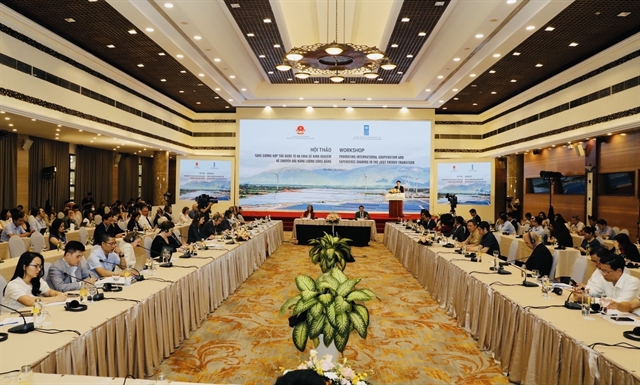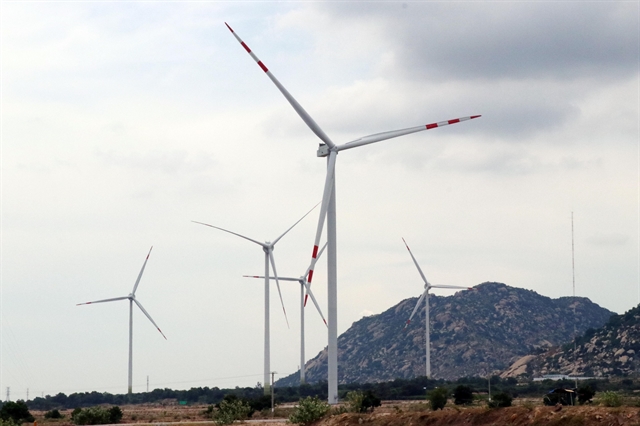 Politics & Law
Politics & Law

 |
| The workshop on "Promoting international cooperation and experience sharing in the just energy transition" attracts government officials and representatives of international organisations. VNA/VNS Photo |
HÀ NỘI — Việt Nam called for international cooperation and support from developed countries in its efforts to achieve just energy transition, noting that the world’s large emitters of carbon dioxide gas must join hands to help developing nations.
The statement was made by Deputy Foreign Minister Đỗ Hùng Việt at a workshop held yesterday in Hà Nội which highlighted the importance of international cooperation and experience sharing in the just, equitable and inclusive energy transition.
The event was co-organised by the Ministry of Foreign Affairs and the United Nations Development Programme (UNDP), attracting more than 300 participants online and offline. They included government officials from the three countries with Just Energy Transition Partnerships (JETPs) – South Africa, Indonesia and Việt Nam, representatives from other developing countries with a strong interest in the energy transition including India, Kazakhstan, Senegal, Philippines, Pakistan, Bangladesh and Brazil as well as representatives of regional and international organisations.
The workshop aims to facilitate knowledge exchange and lesson sharing in various aspects including strengthening international cooperation; formulation, management and monitoring and evaluation of the JETP-RMP/IP (Just Energy Transition Partnerships Resource Mobilisation Plan/ Investment Plan); financial coordination and understanding among key stakeholders, and adoption of existing technology.
Speaking at the event, Deputy Foreign Minister Việt said that Việt Nam’s central development policy has always been to consistently build a green, circular and eco-friendly economy. Although just energy transition will bring many benefits, it will also pose many difficulties and challenges for developing countries, including Việt Nam.
These challenges include ensuring socio-economic development; ensuring the interests of the state, of our people and businesses; ensuring employment and incomes for workers suffering from job losses.
These difficulties are also in terms of technology, capital, and capacity. Just energy transition as well as the implementation of JETP is new, requiring comprehensive transition in various sectors, fields, and levels.
The diplomat noted that Việt Nam’s Power Development Plan 8, which has been recently approved, plays an important role in the country’s efforts to achieve net zero, promote renewable energy and reduce its dependence on coal energy.
Accordingly, the country set a target to have 40 per cent of its electricity consumption generated from renewable energy sources by 2030 and the number will increase to 70 per cent by 2050.
To achieve renewable energy targets, the need for capital is extremely large with an estimate of US$135 billion in 2030 and more than $300 billion by 2050, he said.
In this context, it is crucial to strengthen international cooperation and learn from the world's experience, he said.
Việt emphasised the importance of the “just” aspects of the energy transition, saying that it is an important element to ensure the success of the transition.
He said at the national level, it is important to ensure that energy transition takes into account the full interests of all segments of society, leaving no one behind, and ensure it is a process that benefits all people in each country.
Việt emphasised that, at the global level, the countries that emitted a large amount in the past need to fulfil their responsibility in supporting developing countries that have just started its industrialisation process like Việt Nam.
Currently, there is a commitment to contribute to a green climate fund, a loss and damage fund, but the goal of the fund has not been achieved.
Việt noted that total global military expenditure increased for eight consecutive years and reached US$2.240 trillion in 2022, however, the target to have $100 billion for the green climate fund failed. “This is the paradox that makes us really think and act properly,” he said.
 |
| A wind farm project in the central coastal province of Ninh Thuận. VNA/VNS Photo Công Thử |
Ramla Khalidi, UNDP Resident Representative in Vietnam, said: “There is an urgent need to decouple economic growth from fossil fuel consumption, and address the challenges and strike a balance between climate and development objectives, and ensure that the energy transition is just, equitable and inclusive.”
The energy transition offers opportunities to accelerate the achievement of the SDGs including the creation of decent jobs, the development of new technology, and renewable energy industry sector and the attraction of green and quality investments.
Noting that the energy transition come with challenges, she said it may increase the cost of energy in the short and medium terms, require large upfront investments, demand rescaling and retraining of the workforce and disrupt the livelihoods of local people who are dependent on coal supply chains.
She stressed that that wealthier countries must keep their pledge of US$100 billion a year to support developing countries build resilience, and developing countries need to accelerate the phase out of coal, jumpstart renewable revolution and achieve net zero by 2050.
Emphasising the importance of information and experience sharing, open dialogue and cooperation, she said, regular and open dialogue among countries on different elements in the energy transition trajectory will enhance understanding, build trust and confidence, accelerate technology development and promote innovation for just energy transition.
Noting that finance is "of paramount importance" in the energy transition, Ramla said governments can create favourable conditions for private investment by putting in place forward-looking and transparent regulatory and pricing regimes, and through strategic public investments in essential infrastructure.
She noted: "The energy transition needs to be fair and equity-driven for developing countries to transition sustainably to low-carbon economies and establish climate-resilient trajectories, while realising their sustainable development objectives."
“The energy transition must be just and inclusive for workers, local communities, and affected people through creation of new economic opportunities, job creation, and reskilling, capacity building and enhancing social safety nets,” she said. — VNS




